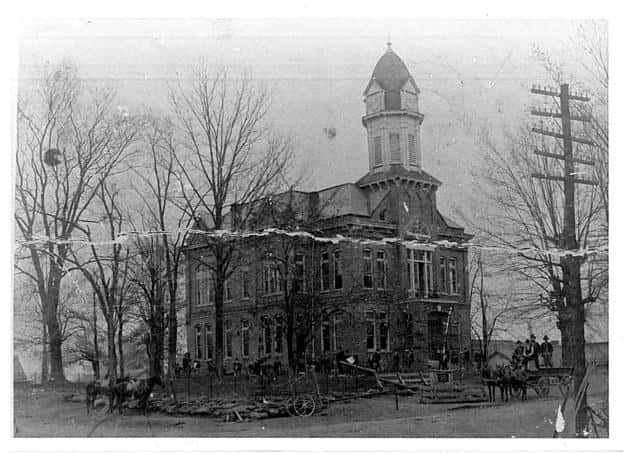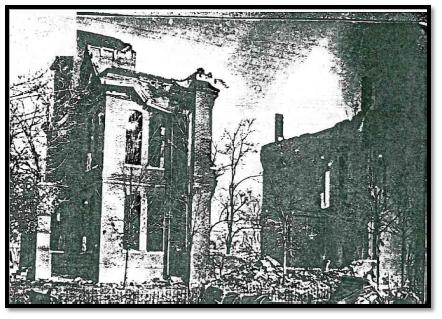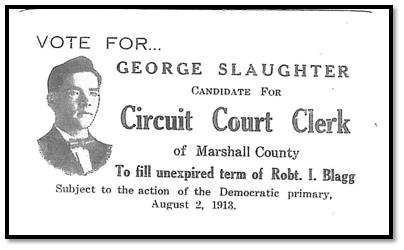 MARSHALL COUNTY COURTHOUSE FIRE
MARSHALL COUNTY COURTHOUSE FIRE
Written by Justin D. Lamb
Above: Marshall County Courthouse which burned in 1914. This photo was taken in around 1900.
(Marshall County Archives)
On Thursday morning, December 17, 1914, the headline in the newspaper read “Burned Down: Court House at Benton Destroyed Wednesday Night—- Circuit Court Clerk Missing.” The whole town of Benton was in disarray and franticly searching for Circuit Clerk George Slaughter who had gone missing after the fire began at the courthouse late Wednesday night. Officials searched all over town for Slaughter and after no luck, they made the determination that Slaughter had perished in the fire that destroyed the courthouse. Sheriff Darnall then informed George Slaughter’s bride of just two weeks, Mae, of the tragic news.
Upon investigation, officials determined that the fire had started at approximately eleven o’clock the following night, and due to the lateness of the hour and the fact that few were awake at the time, the fire gained a big headway before it was the discovered leaving the courthouse virtually unable to be saved. The town of Benton had no fire apparatus and due to the cold weather most water sources were frozen which made fighting the fire impossible. The flames quickly gutted the courthouse leaving only its outer shell and the cause was first determined to be from a faulty flue in the upstairs courtroom. With the courthouse being on top of a hill, the fire was seen from miles around and according to many citizens who witnessed the incident firsthand, the winds of the cold winter night blew scorched court documents all across town.
On Friday December 18, two days after the fire, the Marshall County Fiscal Court met in special session in the office of County Attorney E.L. Cooper on the second floor of the Bank of Marshall County (now the Richard Lewis Building that houses State Farm Insurance on Main Street). At this meeting, the Fiscal Court created a committee to investigate the fire and plans were made to construct a new courthouse. During the investigation, it was discovered that Circuit Clerk George Slaughter had last been seen at Smith’s Grocery on the court square around 8pm on the night of the fire purchasing coal oil for the courthouse lamps. Slaughter told the clerk at the grocery that he was on his way to the courthouse to finish writing up orders for Circuit Court which was set to convene the following day.
Later in the afternoon of December 18, Mae Slaughter received a letter postmarked from her uncle in Cairo, Illinois. Curious, she opened the letter, and to her surprise, she discovered the letter was from her husband whom she thought dead. Relieved that he was alive, Mae frantically read the letter to find out where her husband was. In the letter, Slaughter told Mae that he was in Cairo and wanted her to join him so they could be together. Confused as to why her husband was in Cairo, Mae found Sheriff Darnall and turned the letter over to him.
With the new information, Sheriff Darnall sent out telegrams throughout the area alerting officials in other counties to find Slaughter. Sheriff Darnall along with Commonwealth Attorney John G. Lovett, County Attorney E.L. Cooper, and Deputy Sheriffs Bud Darnall and Hardy McGregor made the trip to Cairo to bring Slaughter home. Many were shocked to know that Slaughter was alive and rumors began to circulate all around town as to why he ran.
At nine o’clock on the morning of Saturday, December 19, Slaughter was arrested by Detective John Perry in Cairo. Shortly after, officials from Marshall County arrived to take Slaughter back to Marshall County for questioning. On the train trip back to Benton, Commonwealth Attorney Lovett asked Slaughter what happened and Slaughter made the following statement: “ I placed a book over the top of the lamp chimney and when the lamp exploded, I made an effort to extinguish the flames but without success. I left the building and hid in the warehouse of J.D. Peterson across from the courthouse, and stayed there until the fire was almost out. I then started down the railroad tracks toward Elva, and there I met my uncle, William Powell, a huckster, who was coming to Paducah. I rode to Paducah with him, arriving there about four o’clock in the morning. I ate a small lunch and slept for a short while. I then went to the Union Station where I boarded a train to Cairo. It was not my intention to avoid the law, but I don’t hardly know why I left. I guess I panicked.”
When questioned about a shortage of the Circuit Clerk accounts, Slaughter that he was off by only a few dimes, but when he was told by Sheriff Darnall that the total shortage of money was five hundred and fifty five dollars, Slaughter denied taking that much and told the Sheriff that he “was not going to take the fall for the crookedness of a former county official.”
On the cold and rainy Sunday afternoon of December 20, Slaughter arrived back in Benton. When he stepped off the train in handcuffs, several reported that his “poor mother wailed an awful cry.” Once at the courthouse, Slaughter handed in his resignation as Circuit Clerk and Sheriff Darnall turned him over to County Jailer J.A. “Uncle Mack” McDaniel who placed him in the county jail. Slaughter’s father, Rueben H. Slaughter mortgaged his home and paid back the five hundred and fifty five dollars and the charges of embezzlement were dropped. Slaughter was still charged with “willfully burning the courthouse” and placed on a $2,500 bond. After being released on bond, Slaughter “went about his business as if nothing had happened and greeted everyone with his ‘usual smile’” reported the Paducah Daily News.
In April 1915, George Slaughter’s case was brought to trial in front of Circuit Judge William Reed at the McCracken County Courthouse. The defense entered a plea of not guilty by reason of insanity. Several physicians including Dr. H.P. Sights, superintendent of Western State Mental Institution of Hopkinsville, took the stand on behalf of Slaughter. Dr. Sights testified that he had examined Slaughter a few days prior to the trial, and in his professional opinion, Slaughter may have been mentally deranged on the night of the fire.
Commonwealth Attorney John G. Lovett introduced several witnesses who were friends and relatives of Slaughter; all who claimed that he was mentally competent. The most damaging piece of evidence introduced against Slaughter was a copy of an application for life insurance applied for by Slaughter days before the crime, in which, in response to one of the application’s questions, Slaughter stated that he or any member of his family had never suffered from any mental health issues and was of sound mind. At the advice of his attorney, George Slaughter did not testify.
On the afternoon of Friday, April 23, after an hour deliberation, the jury found Slaughter guilty of arson and Circuit Judge William Reed sentenced him to a maximum punishment of seven years in the Eddyville Penitentiary.
Above: Aftermath of the Courthouse fire, December 16, 1914
(Marshall County Archives)
After the fire, Marshall County Circuit Court was held in Paducah until the completion of a new courthouse. All other county offices were housed in the second floor of the McGregor Building in Benton and in the south wing of the basement of the Benton Hotel (the National Store building). Construction began on the new county courthouse in early 1915 for the cost of $21,000 and County Judge John B. Wyatt, County Attorney E.L. Cooper, and County Clerk John D. Hall were given the task of management of the Courthouse Construction Committee. The cornerstone for the new courthouse was laid on July 17, 1915 by the Masonic Lodge. According to the Mayfield Messenger, items placed inside the cornerstone were a brief statement about the county; names of the county officials, post offices, and postmasters; the amount of taxpayers property; number of poll tax payers and voters; a copy of the Tribune Democrat and Hardin Enterprise issues reporting the courthouse fire; a photograph of the old courthouse; list of workmen on the new courthouse; and a horseshoe with the Masonic emblem on it.
After his prison term, Slaughter returned home to Marshall County in 1922. For the remainder of his life, Slaughter maintained the courthouse fire was an accident and that he took the fall for the “crookedness of other county officials.” Many believed Slaughter was the victim of dirty politics also. Slaughter had been elected in August 1913 in what became a very dirty campaign between him and interim Circuit Clerk A.A. “Arch” Nelson. Slaughter and Nelson had both worked in the Circuit Clerk’s office under Circuit Clerk Robert Blagg as deputy clerks until Blagg resigned in early 1913 to accept the position as Benton Postmaster. Nelson was appointed by the Circuit Judge as interim clerk until an election could be called later that year. Nelson filed to run in the August Democratic Primary and hoped to run unopposed, but was surprised when Slaughter also filed for the job. Feelings became bitter and the campaign soon became nasty. When the votes were tallied on August 2, 1913, Slaughter won the race and things were never the same between him and Nelson. Slaughter indicated that Blagg and Nelson were “cooking the books” and he had taken the fall for them. Others believed Slaughter was using others as scapegoats for his own wrongdoing.
A few years after Slaughter went to prison for the courthouse fire, former Circuit Clerk Robert Blagg was convicted of embezzlement in 1916 and sent to the penitentiary. After Blagg was arrested, he indicated more county officials were involved in corruption at the courthouse when he made the following statement to a Paducah Evening Sun reporter: “I could open my mouth and tell what I know and I would have plenty of company in the federal prison.” Was there more corruption and scandal at the courthouse as Slaughter and Blagg indicated? History only knows.
The story of the courthouse fire became somewhat of local legend in Marshall County throughout the years and lived on thanks to a local folk song written by Tommie B. Smith who witnessed the courthouse fire firsthand as a child:
“Come on all you rounders if you want to hear
A story about a Circuit Court Clerk who used to live around here.
George E. Slaughter who had an awful name
With matches and a coal can, his reputation was put to shame.
He went to Smith’s Grocery and got a gallon of coal oil
And carried it to the courthouse and caught it aflame.
And there was nothing left in the char but his awful name.
Well, he was going down the road and making good time.
The higher the flames got the faster George would run
Yelling, “Look out boys and here I go.
I’ll be in Paducah by half past four.”
When he got to Paducah, the sun began to shine.
George then began to look for a place to dine.
He found a place on the south of Broadway
And with nowhere else to go he made it a three hour stay.
In Benton, they dug for George until Friday at noon
Until at last they decided that he died when the courthouse blew.
But, the news came out, as you all know,
That George was hiding out in ole Cairo.
Well, when he got to Cairo, he wrote to his wife back home
And said “Come on my honey, you got to go.”
But the Sheriff got busy with a warrant in his hand
And brought George back to the courthouse stand.
They brought him back on the evenin’ train
And it was awful cold and a-drizzlin’ rain.
His folks all met him with an awful wail,
But they carried ole George right on to the county jail.
Well, when George E. Slaughter was released on bail
Uncle Mac went in and turned him out of jail.
Well, Judge Reed turned to Georgie and this is what he said,
“Son, it’s a pity that your books were off by only a dime
But the Commonwealth of Kentucky wants you to pay the time.”
George Slaughter eventually moved to Detroit where he died in the 1943 at the age of 53. He is buried in an unmarked grave in the Slaughter Family Cemetery on Slaughter Road just south of Benton.
Sources:
The Hopkinsville Kentuckian. Hopkinsville, Kentucky. Newspaper archives. 1914- 1915.
The Paducah Sun. Paducah, Kentucky. Newspaper archives. 1914-1915.
Murray Ledger. Murray, KY. Newspaper archives. 1914-1915.
Marshall County Public Library Oral History: John F. Rayburn
Marshall County Public Library Oral History: Homer Lucas
Marshall County Public Library Oral History: Tommie B. Smith
History of Marshall County published by Marshall County Genealogical Society. 1985
Marshall County Archives: Building of the Courthouse File, 1915.



